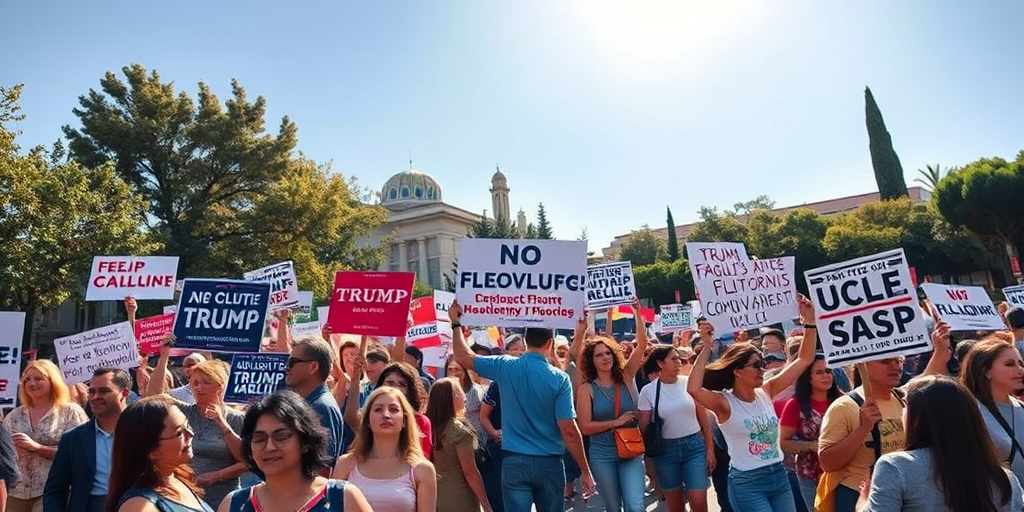Inside Trump’s $1.2-Billion Settlement Demand to UCLA: What’s at Stake?
In a pivotal moment highlighting the intersection of politics and academia, former President Donald Trump’s administration is demanding a staggering $1.2 billion settlement from UCLA, accusing the university of failing to adequately address antisemitism and violating federal civil rights laws. This high-stakes scenario has ignited heated debates among university officials, students, and state leaders, resonating deeply within the community.
The Controversial Settlement Demands
Unveiled in a 27-page proposal, the settlement extends beyond financial reparations, prescribing major policy changes at UCLA. These include eliminating diversity statements in admissions, banning gender-affirming surgeries for minors, preventing transgender women from participating in female sports, and imposing stricter controls on admitting international students perceived to oppose Western values. These demands have drawn sharp criticism, with UCLA faculty associations labeling them as an attack on the university’s commitment to diversity and inclusion.
Local Opposition and Campus Impact
The administration’s demands have sparked widespread opposition, notably from the UCLA Faculty Association and the Council of University of California Faculty Associations. President Anna Markowitz of the UCLA Faculty Association condemned the demands, stating, “It’s not just today’s students and workers who will be harmed by this gross federal overreach — but generations of Californians.”
Such sentiments echo throughout the UCLA community, as more than 600 Jewish students, faculty, and alumni have voiced their disapproval in an open letter opposing the settlement. The $1.2 billion demand and its accompanying policy prescriptions are seen by many as undermining the university’s mission of fostering an inclusive environment.
Broader Community Concerns
This controversy extends beyond UCLA, reflecting larger societal tensions in California and across the nation. Governor Gavin Newsom has unequivocally labeled the settlement demand as “extortionate,” while UC President James Milliken warns that meeting these financial demands would “devastate” the university system.
State officials and university leaders fear the erosion of academic freedom and the imposition of restrictive policies that could ripple beyond UCLA, affecting educational practices statewide. The removal of significant research funding earlier this year, although partially restored by court order, further complicates the university’s financial landscape and underscores the ongoing struggle between federal mandates and institutional autonomy.
Looking Back: Historical Context
UCLA’s current dilemma resonates with past events in California’s higher education system, where issues of diversity, admissions processes, and civil rights have frequently come under scrutiny. In recent years, the University of California system has grappled with implementing policies designed to promote equity while navigating political challenges at both federal and state levels.
For example, a 2023 Supreme Court ruling prohibited race-based criteria in college admissions, echoing the Trump administration’s call to prohibit diversity statements. Yet, students are still encouraged to articulate their backgrounds’ influence on their lives in personal essays, showcasing continued efforts to balance diversity with legal requirements.
Future Implications and Community Outlook
Should the settlement demands be accepted, they may establish a precedent affecting policies on other campuses, impacting how universities nationwide address issues of diversity, inclusion, and civil rights. Conversely, a solid stance by UCLA against these demands could reinforce the value placed on campus autonomy and diversity initiatives, potentially inspiring other institutions to uphold similar principles.
The settlement’s potential impacts extend to current and future students, faculty, and broader community members who value educational environments that are inclusive and reflective of diverse perspectives. As legal negotiations unfold, these stakeholders remain vigilant, advocating for a just outcome that aligns with their values.
Resources for Informed Engagement
Members of the UCLA and broader California communities are encouraged to stay informed about ongoing developments. Various platforms, such as CalMatters, offer in-depth coverage and analysis of this unfolding story, emphasizing the importance of community involvement and transparency. Additionally, community forums and public discussions can provide a platform for collective engagement and dialogue.
In navigating these challenging waters, UCLA stands at a crossroads, emblematic of larger societal debates over civil rights and academic freedom. The outcome of this high-profile confrontation holds significant implications, not just for UCLA but for educational institutions everywhere striving to preserve their core values against external pressures. As this story continues to evolve, its significance remains deeply rooted in local impact, resonating with residents who prioritize a future built on inclusivity and educational integrity.







